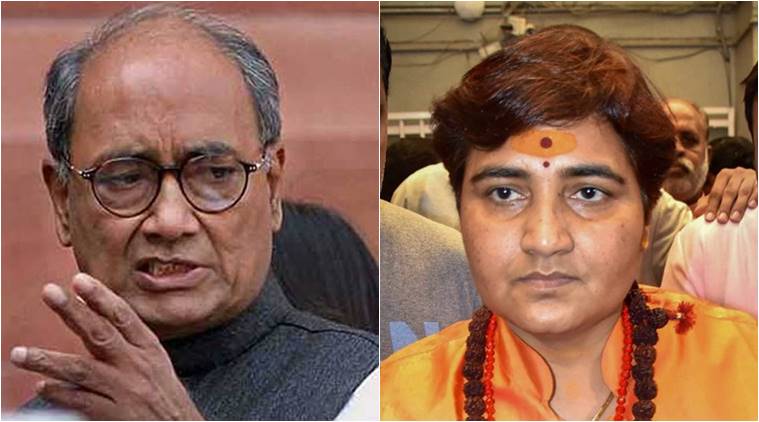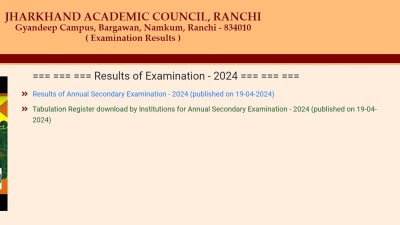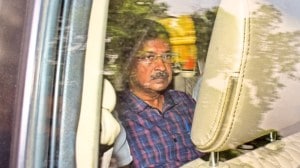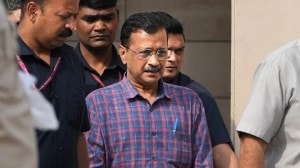- India
- International
Madhya Pradesh: In bettering 2014 showing, BJP kept out ‘dynasts’, leveraged central schemes
For the Congress, an immediate challenge is to ensure the stability of its government in the state. Its huge Lok Sabha majority and clear hegemonic aspirations could lead the BJP to try to get the support of additional MLAs to pull down Kamal Nath’s government.
 BJP pitted Sadhvi Pragya Singh Thakur against Congress veteran Digvijaya Singh in Bhopal. (File)
BJP pitted Sadhvi Pragya Singh Thakur against Congress veteran Digvijaya Singh in Bhopal. (File)
The BJP has swept Madhya Pradesh, winning 28 out of the 29 Lok Sabha seats and increasing its vote share to 58% from the 54.2% it had in 2014. The victory stands in sharp contrast to the results of the Assembly elections held less than six months ago, in which the Congress had dethroned the BJP after 15 years. In the close contest, the Congress had won 114 seats against the BJP’s 109, with the BJP winning a slightly bigger vote share (41.9%) than the Congress (41%). The Congress had formed the government with the help of two BSP, one SP, and four Independent MLAs.
The striking aspect of the Lok Sabha election results is the overwhelming rejection of the senior leaders of the MP Congress, including several “dynasts”. The Congress in the state has been traditionally dominated by prominent families such as those of the Scindias, Digvijaya Singh, Arjun Singh, Kamal Nath, Shri Niwas Tiwari, Subhash Yadav, and Kantilal Bhuria. They have their traditional Vidhan Sabha and Lok Sabha seats, and lead factions in the party in the state, with their own loyalist workers and MLAs. Nearly all these families lost heavily in the elections — among the tall leaders to fall were former Chief Minister Digvijaya Singh (Bhopal), four-time parliamentarian Jyotiraditya Scindia (Guna), and the former Leader of Opposition in the Assembly Ajay Singh (Sidhi). They all lost by huge margins; in contrast, the only successful Congress candidate, the Chief Minister’s son Nakul Nath, could win his family’s seat of Chhindwara by only 37,536 votes.
While the BJP too, has powerful dynasties in Madhya Pradesh, it did not give too many tickets to the members of these traditional political families. In the Vidhan Sabha elections, Babulal Gaur, Shivraj Singh Chouhan, Sundar Lal Patwa, Prahlad Patel, Kailash Vijayvargiya, Narendra Singh Tomar, and Harsh Narayan Singh had succeeded in getting nominations for their relatives, several of whom were elected MLAs.
Explained | Months after Vasundhara Raje ceded Assembly, how BJP swept all LS seats again
In the Lok Sabha election, Chouhan could not get a ticket for his wife Sadhna Singh Chouhan (Vidisha), Leader of Opposition Gopal Bhargav could not get a ticket for his son (Sagar), and former Agriculture Minister Gaurishankar Bisen failed to secure his daughter’s nomination in Balaghat.
Instead, the BJP nominated more newcomers and played the Hindutva card in the most radical manner, as was evident in the campaign of Pragya Singh Thakur, who was fielded in Bhopal against Digvijaya Singh, one of the prominent secular faces of the Congress. Thakur, who faces charges of terrorism in the 2008 Malegaon blast case, fought a very active electoral battle, even canvassing for other BJP candidates, and giving a strident communal overtone to her party’s campaign.

The narrative of Hindu nationalism worked well in the context of the Pulwama terrorist attack and India’s response to Pakistan, which had already helped the BJP shift the political discourse to national security from issues like unemployment and the agricultural crisis. That the Congress could not capitalise on these issues was due also to the flawed implementation of its promises on these fronts at the state level. At the time of the Vidhan Sabha elections, Rahul Gandhi had promised to waive agricultural loans within 10 days of the Congress forming the state government; however, despite having signed the loan waiver file on the day he took oath, Chief Minister Kamal Nath failed to implement the decision on the ground.
Explained: In Hindi heartland, upper castes dominate new Lok Sabha
On the other hand, central government welfare schemes like the Pradhan Mantri Awas Yojana, Swachh Bharat Abhiyaan, and Ujjwala Yojana seemed to have nudged backward caste voters towards Narendra Modi and the BJP. Some 36.6 lakh houses in rural areas, and 5.5 lakh in urban areas, were sanctioned under the PMAY. Under the Swachh Bharat scheme, more than 54 lakh toilets were sanctioned for Madhya Pradesh. Most of the 15.4 million BPL people benefitted from Ujjwala. And just before the elections, came the transfer of Rs 2,000 to accounts of farmers. Importantly, communication was constant and effective: people were told about these schemes and their benefits.
For the Congress, an immediate challenge is to ensure the stability of its government in the state. Its huge Lok Sabha majority and clear hegemonic aspirations could lead the BJP to try to get the support of additional MLAs to pull down Kamal Nath’s government.
Christophe Jaffrelot is Senior Research Fellow at CERI-Sciences Po/CNRS, Paris, professor of Indian Politics & Sociology at King’s India Institute, London, and non-resident scholar at Carnegie Endowment for International Peace. Pankaj Singh is a researcher and social activist who works in the areas of community mobilisation and participatory governance.
More Explained
EXPRESS OPINION
Apr 19: Latest News
- 01
- 02
- 03
- 04
- 05








































